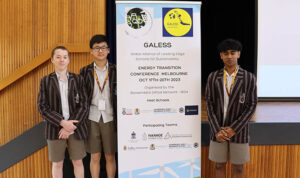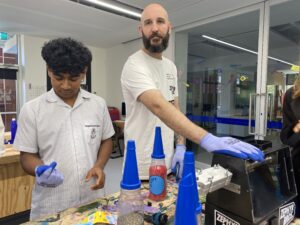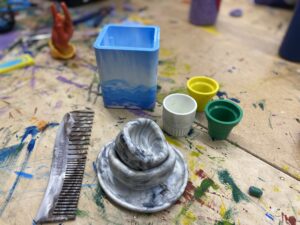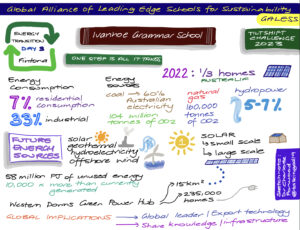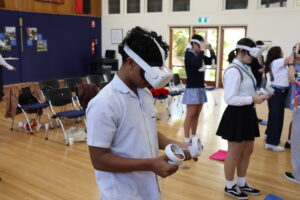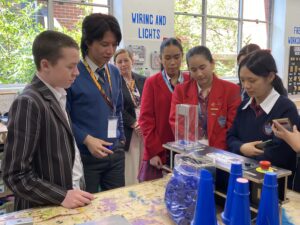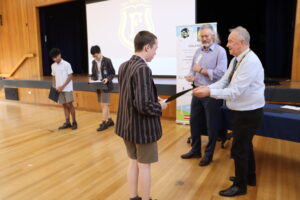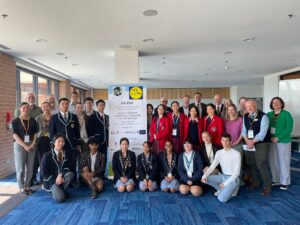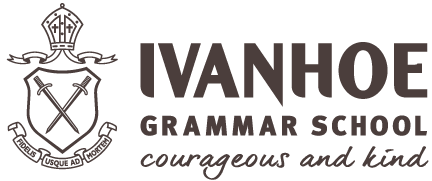GALESS TiltShift Challenge
This year, three Year 10 students from across the School took part in the GALESS TiltShift Challenge. GALESS (Global Alliance for Leading Edge Schools in Sustainability) is an international network of schools committed to youth leadership development for global good. Each year a challenge is presented to students, who work together in a team to write an academic research paper on the chosen theme. The TiltShift Challenge culminates in conferences held in multiple cities around the world, attracting students from schools internationally who have a focus on global citizenship and sustainability. This year conferences were held in Boston, Bali, Poland, and for the first time, Melbourne!
The Melbourne conference was hosted by the Boroondara Gifted Network, a network of educators working with highly able students in Boroondara and surrounding areas. The 2023 conference theme was Energy Transition and Australian students were tasked with researching and writing a 5000-word paper covering the following:
- An investigation into Australia’s energy system.
- Propose a plan for the transition of Australia’s energy system away from carbon-based sources.
- Examine the global implications of Australia’s energy system.
During Term 2 and 3 this year the Ivanhoe team met at University Campus and online via Microsoft Teams, to share their research and propose their plan for a transition to clean energy in Australia. During the process, the team attended a Design Thinking session led by Sid Verma (founder of BrainSTEM) to help the team form their research question and take their project forward. The team also interviewed Damien Hill, an Ivanhoe parent and CCO to a global renewable energy company, which gave them an inside view into the progress and challenges of solar energy in Australia. Through their research, the team decided to propose a plan for promoting personal storage batteries for solar energy. The abstract from their paper follows:
Australia is a large, developed nation with a complex energy system. The nation relies mainly on coal as a source of energy for electricity production, with coal being used to produce around 70% of the country’s energy requirements. Apart from coal, the country also uses smaller amounts of sources including natural gas and hydroelectricity. Due to this reliance on fossil fuels, Australia is contributing heavily to the climate crisis, and the ever-increasing figures on energy production from carbon-based sources will only exacerbate this problem. Australia is already working towards transitioning towards a carbon-free future, with goals in alignment with the Paris Agreement of net zero emissions by 2050, but more action needs to be taken towards the promotion and usage of renewable sources not only on a large scale, but also for small, domestic, and household uses. Solar power is a renewable, fully carbonless source of energy that has already been extensively used in industry and commercial settings, and many large companies have taken this transition away from grid electricity. Australia has some of the biggest uptakes of solar panels in the world however most households do not have solar panels, and even less use personal storage batteries. If households around Australia were to transition to these renewable energies through a variety of ways, with educational campaigns on the implications and benefits of solar, solar batteries in households, and other renewable sources, the country would see a significant boost towards achieving its goals of net zero by 2050, setting the country up to be a leader in global renewable energy across all sectors of consumption.
The TiltShift Challenge culminated with a four-day conference held at the following schools across Melbourne: Scotch College, Camberwell Grammar, Camberwell Girls Grammar and Fintona Girls School, and included teams from Australia, Singapore and Austria. Each team shared their proposed plan for energy transition that was based on their country’s current energy sources, geography and political climate. Throughout the conference students also heard from keynote speakers in the clean energy sector, and took part in workshops that included solar energy, plastics recycling, and a virtual reality session where students were able to see the impacts of climate change on cities around the world.
Congratulations to Phil, Aakash and Lucas who completed the challenge, submitted their paper and presented to their peers on the final day of the conference at Fintona Girls School.
It was an interesting and refreshing experience to attend the GAELESS science conference. The different points of view of students from around the globe fascinated me and helped me to better grasp the global scientific issues relating to renewable energy. It was a challenge for me to understand topics that were outside of my area of knowledge, which forced me to learn quickly. My perspective on energy consumption has evolved with a focus on the importance of teamwork to find answers to complex questions that need to be broken down. This experience will help me in my future academic endeavours. It has also allowed me to think about my own decisions when it comes to renewable energy and energy consumption. The welcoming atmosphere of the conference, which brought together students from different schools and nations, enabled an active interchange of ideas. Students in the future should consider participating in this challenge, as it is a unique and eye-opening experience. (Aakash, Year 10 2023)
Being part of the GALESS TiltShift Challenge was an interesting yet challenging endeavour. I enjoyed collaborating with my team members across the months before the conference, and together, we delved into what felt like an endless river of scientific information, particularly on Australian energy and its intricate systems. We all gained valuable insight and experience in the writing process of a large academic paper which will without a doubt be beneficial for later education, especially with newly acquired referencing, citation, and organisation skills. The conference was jam-packed with activities and workshops, one of which took us to the pinnacle of adventure, quite literally, as we ascended to the rooftop of Camberwell Grammar to see their solar panels, which provide 48% of the school’s energy needs. We had the privilege of hearing from other students and experts speak on a wide range of topics, giving us insight into the current developments in renewable energy both in Australia and abroad.
The feeling of absolute pure relief was a much-anticipated reward after completing our presentation on the very last day. We’d completed the challenge, pushing through the marathon of calls, planning sessions across the campuses, meetups in and out of class time, and enough writing to make the likes of Shakespeare and J R Tolkien reconsider their career choices! Sure, the GALESS challenge isn’t everybody’s definition of “a rambunctious adventure infused with unchecked fun,” but the learning experiences and knowledge gained are well-worth partaking in the internationally recognised project, especially for students with a deep interest in science and anything STEM-related. (Phil, Year 10 2023).
An interesting aspect of the GALESS TiltShift Challenge was learning about the Australian energy system, Australian energy use, energy production, and how Australia can move to more renewable and environmentally friendly energy sources in the future. We had originally intended to research mainly Victoria, though we found it quite challenging to find information regarding power production and use in a single state, so we decided to change our report to research at a national level. Apart from our team’s research, we also learned a lot from the other team’s presentations at the conference. The conference was very enjoyable, with a variety of activities and speakers from participating and hosting schools, but also from experts in the power/ electricity/ solar industry. We were also able to meet many students from other local and international schools. (Lucas, Year 10 2023)
The collection of academic papers submitted by schools attending the Melbourne conference can be found here.
We look forward to having an Ivanhoe team represented at the 2024 TiltShift Challenge!
